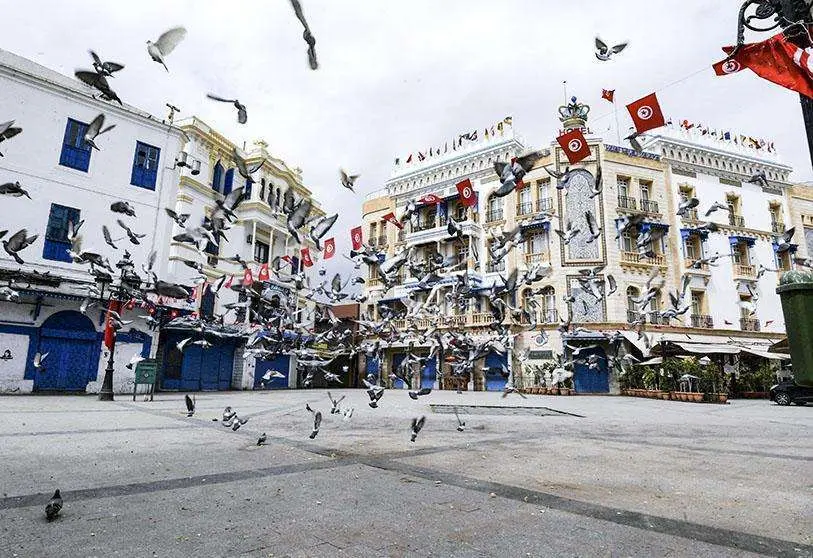Ten years after "Error 404"

The Tunisian transition is celebrating its tenth anniversary and with it the arrival of freedom of expression and of the press, one of its greatest achievements after nearly 60 years of dictatorial regimes, although it is now threatened by the arrival of businessmen, political pressure and precariousness.
Before fleeing to Saudi Arabia, Zine El Abidine Ben Ali delivered what was to be his last speech to calm the social protests that had been spreading for a month.
The autocrat promised not to run for election again, to lower the prices of basic foodstuffs and to lift press and internet censorship.
Gone are the arrests of journalists, the closure of media outlets and the popular message of "Error 404, page not found", which censored thousands of websites under the pretext of banning "pornographic content and against Muslim values".
The cat "Willis from Tunis", which until then had been limited to entertaining friends and family, flooded the networks, although its creator, Nadia Khiari, kept her anonymity for several months, "a reflection of someone who has lived in a dictatorship all her life".
"Once again she took us for fools. The dictatorship is a constant humiliation and infantilisation," the author of "10 Years and Still Alive", who compiles the most absurd moments, but also the hardest of the nascent democracy, told Efe.

From that day on, Willis harasses everyone who crosses her path: Islamists, nostalgic for the old regime, police and even the coronavirus.
Khiari regrets that the transition is taking "too long" and confesses that the pressures are still continuing. Ben Ali left - he died in September 2019 - "but we need time to get rid of this mechanism that is well anchored in our brains, perhaps the generations born after 2011 will manage to change things".
For the journalist Haythem El Mekki, who provides a scathing report on current affairs every day, the profession is going through one of the most "tense" times in recent years and accuses the Al-Karama Coalition, the fourth largest parliamentary force, of turning the attack on journalists into what it calls its "trademark".
"2020 equals 2012 plus inflation. We are reproducing the same pattern of political violence and radicalisation," he says, referring to the beginning of the transition, when there were Jihadist threats and political assassinations.
The director of Reporters Without Borders (RSF) in North Africa, Souhaieb Khayati, believes that all governments after the revolution have tried to limit freedom of expression and the press, but that the situation is alarming after the legislative and presidential elections in 2019.
On the one hand, he stresses, the Presidency of the Republic restricts media coverage and filters journalists "although it is more a question of amateurism than an attack on freedom, Tunisia cannot afford it".
"On the other hand, the Parliament has deputies who are leaders of pirate media that have been broadcasting for years thanks to their political contacts despite not having a permit," he said.
According to the RSF world press freedom ranking, out of 180 countries, Tunisia has risen from 134th to 72nd place over the last decade.
"Journalists are no longer arrested, attacked or banned, but there is no longer any need. All we have to do now is keep them in a precarious socio-economic situation," insists Khayati, who recalls that the average salary is 300 euros a month and they have hardly any social security coverage.

Attacks and restrictions on informers, mainly by the security forces, have multiplied, reaching 182 last year, according to the National Union of Tunisian Journalists (SNJT).
"No journalists are imprisoned, but legal proceedings are under way against several of them. Two bloggers are in custody for having denounced cases of corruption on social networks," says its president, Mohamed Yassine Jlassi.
In addition, he adds, the "anarchic" liberalisation of the audiovisual sector has led many businessmen to invest in media used as "electoral platforms".
A study carried out in 2016 by RSF and the Alkhatt association reveals that six of the ten existing television channels are directly or indirectly linked to a party or political leader.
The most obvious case is that of Nessma TV, the most watched channel in the country, founded by the businessman and president of the "Heart of Tunisia" party, Nabil Karoui, who is currently in custody for an alleged case of money laundering.
Finally, the trade unionist is concerned about the legislative initiative to exempt television and radio stations from a licence from the Audiovisual Authority (HAICA), which would make it possible to legalise several media and "clean" the money from corruption.








